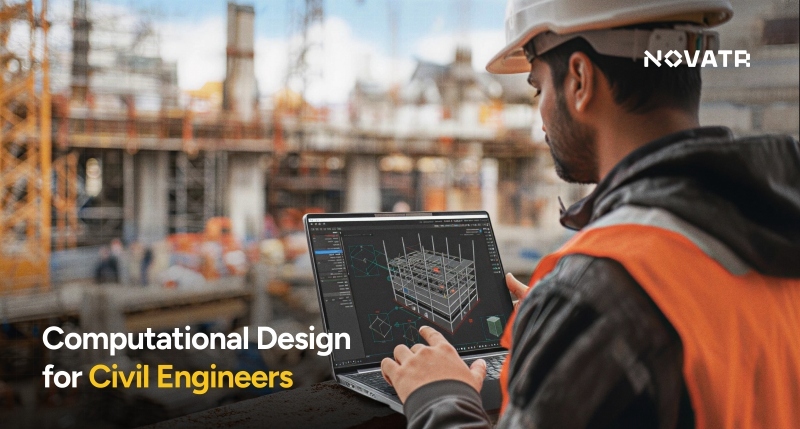
A strong career in BIM is no longer optional for civil engineers; it’s essential. In today’s construction and infrastructure environment, projects demand expertise in digital modelling, sustainability metrics, and adaptable tech skills. Engineers who lack this fluency risk being sidelined in competitive markets.
According to a recent report by Georgetown University Center on Education and the Workforce, the U.S. economy will need an additional 5.25 million workers with training beyond high school by 2032, and many of the gaps are concentrated in engineering fields. This means the stakes are high for those seeking BIM jobs or advancing with BIM for civil engineers. As the future of civil engineering shifts toward digital workflows and sustainability, continuous learning becomes the differentiator.
Why Traditional Skillset Isn’t Enough Anymore?
Civil engineers trained only in traditional methods such as drawing boards, manual calculations, and site supervision are realizing that these conventional skills alone no longer guarantee long-term success. The construction sector is evolving rapidly, and staying relevant means being adaptable, tech-savvy, and ready to integrate new methodologies into daily workflows.
1. Projects demand BIM knowledge, sustainability understanding, and tech adaptability
Modern infrastructure projects are no longer planned and managed using isolated design tools. They depend on digital collaboration through Building Information Modelling (BIM). BIM in construction site management connects architects, structural engineers, and project managers on a single digital platform, reducing errors and saving time. Civil engineers familiar with BIM can visualize construction sequences, detect design clashes, and make informed decisions early in the project lifecycle.
Modern projects demand more than technical precision and call for a strong understanding of sustainability. Engineers need to know how materials, design choices, and environmental data impact energy use, carbon footprint, and lifecycle costs. Adopting sustainable practices ensures compliance with regulations and supports eco-friendly construction.
Moreover, adaptability to emerging technologies has become indispensable. From drones and laser scanning to AI-driven scheduling and virtual inspections, digital tools now drive efficiency. Engineers who combine traditional expertise with digital adaptability position themselves as leaders in innovation.
2. Engineers without digital fluency risk being sidelined
Digital fluency is now a core requirement for civil engineers, not a bonus skill. Project teams collaborate using cloud-based systems, coordinate through shared data environments, and rely on real-time information for decision-making. Without comfort in such platforms, engineers risk being left behind.
The adoption of BIM for civil engineers has streamlined design and project delivery, improving efficiency and accountability. Engineers lacking exposure to these workflows face reduced employability, as employers increasingly expect candidates who can manage digital coordination, simulation, and data interpretation.
As organizations move toward paperless documentation and automation tools, engineers must know how to integrate software solutions for faster design validation and project reporting. Digital literacy ensures a smoother transition between design and execution phases, contributing to project success.
3. Sustainability and regulatory pressures raise the bar
Sustainability regulations are reshaping how the construction sector operates. Civil engineers are now expected to design with environmental responsibility in mind. That means evaluating materials for durability, resource efficiency, and recycling, skills that go beyond traditional engineering education.
When a professional upskill as a civil engineer in areas such as green construction and digital modelling, they gain the ability to balance technical feasibility with sustainability goals. Tools like BIM allow engineers to simulate environmental performance, analyze water and energy consumption, and ensure compliance with updated standards.
The traditional approach of designing first and considering sustainability later is being replaced by integrated design thinking. Continuous upskilling ensures engineers stay aligned with evolving environmental codes and industry expectations.
The Power of Continuous Learning

Continuous learning allows engineers to adapt, innovate, and maintain professional relevance. It enables them to transition from routine execution to strategic problem-solving roles. For those building a career in BIM, it’s a pathway to higher positions and stronger salaries.
How upskilling (specifically in BIM) helps you get a better job and salary
- Specialized roles: Engineers with BIM expertise qualify for roles like BIM Coordinator, BIM Manager, and Digital Project Engineer, which are increasingly in demand across global markets.
- Higher earning potential: Professionals trained in BIM earn higher salaries because of their ability to streamline operations, reduce design conflicts, and drive collaboration efficiency.
- Versatile career movement: BIM-trained engineers can transition easily between design, documentation, and site coordination roles, making them more versatile in their career paths.
- Strong digital foundation: How to learn BIM develops a mindset for continuous growth, ensuring long-term adaptability in an evolving industry.
How Novatr Enables Continuous Learning That Works?
For professionals aiming to strengthen their expertise, Novatr provides a hands-on learning platform that aligns directly with industry expectations. The BIM Course for Civil Engineers helps learners bridge the gap between traditional education and modern, technology-driven construction practices.
Here’s what learners gain:
- Comprehensive training in essential BIM tools such as Revit, Navisworks, and Dynamo to create, manage, and coordinate digital construction models.
- Practical modules focused on BIM in construction site management, allowing learners to manage real-world workflows and understand data-driven coordination.
- In-depth learning on sustainability integration through BIM workflows, enabling engineers to evaluate environmental performance and comply with green building standards.
- Flexible online classes designed for working professionals looking to upskill as a civil engineer without disrupting their current commitments.
- Mentorship from industry experts currently working in global BIM jobs, offering insights into how digital tools are applied across large-scale projects.
- Guidance on developing a professional BIM portfolio, helping learners demonstrate their skills to employers and advance into specialized roles.
- Opportunity to earn a dual certification from Novatr and the National Skill Development Corporation (NSDC), validating the learner’s technical proficiency and readiness for the global job market.
So Stop waiting for change. Start building it!
With Novatr’s BIM Professional Course for Civil Engineers, transform your traditional skills into future-ready BIM expertise.
Disclaimer: Course details, including curriculum, duration, fees, and related information, are for informational purposes only and may change at the company’s discretion without prior notice. Please visit the official course page or contact our admissions team for the latest updates.
Conclusion
In today’s evolving construction environment, a career in BIM is important for civil engineers aiming to stay ahead. With growing demand for sustainability, digital workflows, and efficient collaboration, relying solely on traditional skillsets is no longer enough.
Upskilling, particularly in BIM, opens doors to new opportunities, stronger salaries, and positions engineers for success in civil engineering. The BIM professional Course for Civil Engineers offered by Novatr enables upskilling professionals to gain confidence with BIM in construction site management and secure rewarding BIM jobs in a fast-transforming industry.
Continuous learning ensures every engineer not only keeps up with change but leads it. Check out our resource page for the latest updates and tips on advancing your career.
Was this content helpful to you



.jpg)




